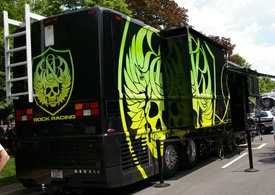 Following a long, rocky period of unpaid wages, dropped riders and a rejected licence application by the UCI, the Rock Racing team faces further uncertainty after its primary sponsor Rock & Republic filed for Chapter 11 bankruptcy protection.
Following a long, rocky period of unpaid wages, dropped riders and a rejected licence application by the UCI, the Rock Racing team faces further uncertainty after its primary sponsor Rock & Republic filed for Chapter 11 bankruptcy protection.
The fashion brand said on Thursday that it had taken the measure, which is typically used by companies or individuals with substantial debts to continue to function while they follow debt repayment plans. Essentially, it can temporarily protect the company from efforts by creditors to recoup what they are owed.
“The Chapter 11 filing is a strategic action that will alleviate balance sheet burdens and enable us to adopt the financial and operational initiatives needed to support the brand’s growth needs,” Geoffrey D. Lurie, the company’s newly named chief restructuring officer said, according to the LA Times. “We are confident that this is the right move for Rock & Republic.”
He added that it was exploring “financial relationships” and would sharpen its focus to emphasize its core apparel and footwear businesses.
The company was founded in 2002 by Michael Ball, a former competitive cyclist known for his brash personality. It was based around high-price fashion clothing, and has used models such as Victoria Beckham to promote its products.
Ball then founded the team in 2007 and later guaranteed its notoriety by signing up several riders linked to doping scandals, including Oscar Sevilla, Francisco Mancebo and Tyler Hamilton. It also signed Rudy Pevenage as a sporting director; this was another controversial move, as Pevenage was implicated on Operación Puerto.
Ball embraced the bad boy image, using team kits bearing a large skull motif, while simultaneously insisting that everyone deserved a second chance.
Last year several of its riders were demoted to amateur status while others were fired. Allegations of unpaid wages suggested problems with its sponsorship, but Ball nevertheless attempted to secure a UCI Professional Continental license for this season.
This was rejected, as was an application for a UCI Continental registration under a Mexican licence. Floyd Landis, who had been due to race with the team, left at that point. Ball instead that the team would press on, saying that its riders would be the ‘highest-paid amateurs’ in the sport.
He has long been defiant about predications the team would collapse, using the catchphrase ‘Rock’s Not Dead,’ in double page magazine advertisements. However the latest news about the bankruptcy protection suggests that while the team may not be dead, the sponsoring company is certainly on life support. The net result is further uncertainty and stress for the riders concerned, and doubts about the long term viability of the cycling project.